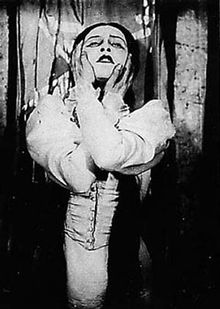Hanna Rovina
| Hanna Rovina | |
|---|---|

Hana Rovina in The Dybbuk (1920)
|
|
| Born | 15 September 1888 |
| Died | February 3, 1980 (aged 91) |
| Citizenship | Israeli |
| Occupation | Actress |
Hanna Rovina (Hebrew: חנה רובינא; 15 September 1888 – 3 February 1980), written also Hannah, Hana, or Chana Rovina or Robina, Israeli actress, is recognised as the original "First Lady of Hebrew Theatre".
Born in Byerazino, Minsk district (guberniya), Belarus, in the Russian Empire, she originally trained as a kindergarten teacher, at a course for Hebrew-speaking kindergarten teachers in Poland.
She began her career on stage at the "Hebrew Stage Theatre" of Nahum Tzemach. She joined the Habima theatre in 1917 just as it was being launched, and participated in its first production, a play by Yevgeny Vakhtangov. She became famous for her role as Leah'le, the young bride who is possessed by a demon in The Dybbuk by S. Ansky.
In 1928, Rovina and the other actors of Habima immigrated to Mandate Palestine, where Habima became the flagship of the new national theatre movement, and Rovina was soon recognized as the movement's leading actress. The image of Rovina in her role as Leah in the Moscow performance of The Dybbuk, in a white dress, with her long black braid, became an icon of the emergent Hebrew theatre, and especially of Habima.
She filled every role she played with dramatic expression, taking every part very seriously and trying to live the life of the character, as prescribed by the Stanislavski School of acting. Outside the theatre, she was a non-conformist, even having a child out of wedlock with the Hebrew poet Alexander Penn, though this was very unusual for that time. Her lifestyle won her many admirers, even among people that did not frequent the theatre. Her admirers within the theatre included writer Nissim Aloni, who wrote a play, Aunt Liza, especially for her. Of course, Rovina played the lead.
...
Wikipedia
